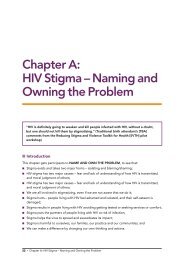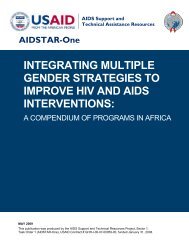Guide for Community Assessments on Women's Health Care - ICRW
Guide for Community Assessments on Women's Health Care - ICRW
Guide for Community Assessments on Women's Health Care - ICRW
Create successful ePaper yourself
Turn your PDF publications into a flip-book with our unique Google optimized e-Paper software.
Part B – How To Document<br />
Sessi<strong>on</strong>s and Write a Report<br />
A crucial part of the community assessment process is to document participants’ comments during<br />
each workshop and produce a report that summarizes the assessment’s findings. It is important to<br />
dedicate sufficient attenti<strong>on</strong> and resources to this task. The team member who is resp<strong>on</strong>sible should<br />
be some<strong>on</strong>e who is a good listener, is not likely to get drawn into the discussi<strong>on</strong> and understands<br />
how to take notes that will be useful.<br />
There are three levels of documentati<strong>on</strong> during a community assessment process:<br />
1) Taking notes during the workshop sessi<strong>on</strong>s;<br />
2) Preparing site reports; and<br />
3) Writing the final synthesis report.<br />
Good in<str<strong>on</strong>g>for</str<strong>on</strong>g>mati<strong>on</strong> can be lost if notes are not taken properly. Be aware of some comm<strong>on</strong> pitfalls:<br />
●●<br />
●●<br />
●●<br />
●●<br />
Sharing this work within a team but not clarifying whose resp<strong>on</strong>sibility it is to pull all of the<br />
notes together.<br />
Getting wrapped up in the discussi<strong>on</strong> and <str<strong>on</strong>g>for</str<strong>on</strong>g>getting to take notes.<br />
Missing crucial in<str<strong>on</strong>g>for</str<strong>on</strong>g>mati<strong>on</strong> by trying to record all of the detail, rather than key words.<br />
Losing some of the cards, flipcharts and other materials produced by participants during the<br />
body mapping, community mapping or other exercises.<br />
Taking Notes During Workshop Sessi<strong>on</strong>s<br />
The workshop recorder is resp<strong>on</strong>sible <str<strong>on</strong>g>for</str<strong>on</strong>g> documenting:<br />
●●<br />
●●<br />
●●<br />
All the discussi<strong>on</strong>s during each <strong>on</strong>e-day workshop;<br />
The material produced by participants (body map and extra in<str<strong>on</strong>g>for</str<strong>on</strong>g>mati<strong>on</strong> that participants add,<br />
community map and services); and<br />
A summarized profile of participants – numbers, age groups, gender, occupati<strong>on</strong>.<br />
Here are some tips <str<strong>on</strong>g>for</str<strong>on</strong>g> recording notes:<br />
●●<br />
●●<br />
●●<br />
●●<br />
●●<br />
●●<br />
●●<br />
●●<br />
Sit where you can easily hear the participants.<br />
Get permissi<strong>on</strong> at the start of the workshop to take notes <strong>on</strong> what people are saying. Explain<br />
that you will not identify those present in relati<strong>on</strong> to any statement recorded.<br />
Use a notebook or a laptop computer <str<strong>on</strong>g>for</str<strong>on</strong>g> taking notes.<br />
Record all the statements made, including arguments and disagreements.<br />
Record key phrases in the local language.<br />
Record stories, examples or proverbs participants use to explain their ideas.<br />
Keep it simple. Use short words and avoid technical/academic jarg<strong>on</strong>.<br />
Be factual – record what was said, rather than what you think was implied. Record your own<br />
observati<strong>on</strong>s separately.<br />
Chapter D: Tips <str<strong>on</strong>g>for</str<strong>on</strong>g> Running Participatory Workshops 73

















